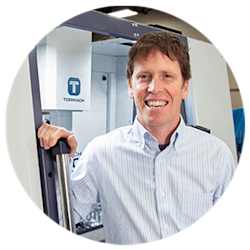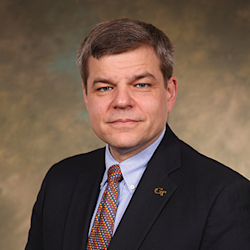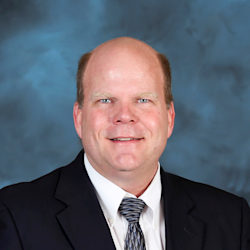Open-source Tools for Advanced Manufacturing
Open-source software has a long history of widespread use. For example, the most popular firmware used on consumer 3D printers, Marlin, is an open-source project. Open-source projects are also increasingly used in industry. For example, Google and Facebook both have machine learning libraries that leverage the open-source scientific Python ecosystem. In manufacturing, one key open-source project is LinuxCNC, a platform that provides a user interface, G-code interpreter, motion planning, and low-level machine control for CNC machine tools. Another important open-source project is the Robot Operating System (ROS), which has been an enabling platform for robotics researchers for some time and is seeing increased use in industry. The open nature of the projects provides a foundation from which companies can build custom solutions, making the development of next-generation systems easier. This session will discuss the role of these open-source tools in the future of advanced manufacturing.
Didn't get a chance to attend? View the recording today!
Meet our Speakers!

Dr. Vaughan is currently an Associate Professor in Department of Mechanical Engineering at the University of Louisiana at Lafayette. While on a leave-of-absence from that appointment, he is working as an R&D Staff Member within the Manufacturing Demonstration Facility (MDF) at Oak Ridge National Laboratory (ORNL). Dr. Vaughan received his Ph.D. from the Georgia Institute of Technology in 2008. Upon graduation, he completed postdoctoral appointments at Tokyo Institute of Technology and Georgia Tech, then joined the faculty at the University of Louisiana at Lafayette (UL Lafayette) in August of 2012. Dr. Vaughan's current research interests include the integration of conventional control methods and machine-learning-based controllers, energy-conscious control design, controller influence on human operator performance, mobile robotics for inspection and search-and-rescue operations, multi-agent additive manufacturing, and autonomous maritime systems. Dr. Vaughan was the winner of the 2013-2014 Rising Star Award, the 2015 Young Researcher of the Year, the 2014-2016 Rising Star Award, 2014-2016 Innovator Award, 2016-2018, Innovator Award, and the 2017-2018 Outstanding Undergraduate Research Mentor Award at the University of Louisiana at Lafayette.

Daniel Rogge, CEO Tormach Inc, has a diverse background that includes experience as a professional metal fabricator, educator, motion control engineer, and software developer. Mr. Rogge holds a BA from Grinnell College, and an MS in Industrial Engineering with a focus on manufacturing from the University of Iowa. He continues to focus professionally on what he spent his time doing at the University of Iowa: helping people make things.

Matt Robinson is the Program Manager for the ROS-Industrial Consortium - Americas, an industry-driven open source program bringing advanced manufacturing solutions for the industrial robotics community. Along with this role Mr. Robinson leads a team of software developers deploying advanced software solutions in the field for end-users, that include autonomous motion planning, real-time control, and advanced computer vision. Prior to his current role, Mr. Robinson was team leader for Caterpillar's Manufacturing Technology Automation Research where he led development and deployment of automation tools to improve the performance and productivity of Caterpillar manufacturing facilities around the globe. Mr. Robinson also led manufacturing value stream design initiatives that led to the deployment of over 50 robotic/automated manufacturing systems around the world. Mr. Robinson earned a Master’s Degree in Welding Engineering from Ohio State University

Thomas Kurfess is the Chief Manufacturing Officer for Oak Ridge National Laboratory (ORNL). In this position he is responsible for the strategic planning for advanced manufacturing at ORNL. His research focuses on the design and development of advanced systems by rapidly developing, scaling and integrating new technologies into production operations. Kurfess has significant experience in production operations, manufacturing systems and policy issues related to advanced manufacturing. He began his academic career at Carnegie Mellon University where he rose to the rank of Associate Professor. In 1994, he moved to the Georgia Institute of Technology where he rose to the rank of Professor in the George W. Woodruff School of Mechanical Engineering. In 2005, he was named Professor and BMW Chair of Manufacturing in the Department of Mechanical Engineering at Clemson University’s International Center for Automotive Research. In 2012, he returned to Georgia Tech as a Professor of Mechanical Engineering and the HUSCO/Ramirez Distinguished Chair in Fluid Power and Motion Control. During 2012-2013, Kurfess was on leave serving as the Assistant Director for Advanced Manufacturing at the Office of Science and Technology Policy in the Executive Office of the President of the United States of America. In this position, he had responsibility for engaging the federal sector and the greater scientific community to identify possible areas for policy actions related to manufacturing. He is Past President of the Society of Manufacturing Engineers (SME). He is currently serving on the Board of Governors for the American Society of Mechanical Engineers (ASME), the Board of director for SME, the Board of Director for the National Center for Defense Manufacturing and Machining (NCDMM), the National Center for Manufacturing Sciences (NCMS), the Board of Trustees for the MT Connect Institute, and he Executive Committee of MxD (formerly the Digital Design and Manufacturing Innovation Institute). He has received numerous awards including a National Science Foundation (NSF) Young Investigator Award, an NSF Presidential Faculty Fellowship Award, the ASME Pi Tau Sigma Award, SME Young Manufacturing Engineer of the Year Award, the ASME Blackall Machine Tool and Gage Award, the ASME Gustus L. Larson Award, an ASME Swanson Federal Award, and the SME Education Award. Kurfess is a member of the National Academy of Engineering, a Fellow of the AAAS, ASME, and SME. He earned his PhD, SM and SB in mechanical engineering, and an SM in Electrical Engineering and Computer Science from the Massachusetts Institute of Technology.

Lonnie Love, Ph.D., is the group leader of ORNL’s Manufacturing Systems Research Group. He has over 20 years of experience in the design and control of complex robotic and hydraulic systems. His primary expertise is in the areas of design, robotics, hydraulics, additive manufacturing and nanomaterials. He is the project lead for the Big Area Additive Manufacturing program at ORNL that is focusing on large scale, high speed polymer and metal additive manufacturing. The program has partnered with Cincinnati Incorporated for commercialization. Recent research efforts have focused on developing new lightweight low-cost hydraulic systems through additive manufacturing. Example applications include underwater robotics, prosthetics and haptic interfaces. Lonnie was ORNL’s 2009 Inventor of the year, has over 30 invention disclosures and patents and 75 peer reviewed publications. He serves on the scientific advisory board for NSF’s Center for Compact and Efficient Fluid Power and is on the Medical and Scientific Advisory Board for OrthoCare Innovations.
